R-TYPE III - THE THIRD LIGHTNING
|
|
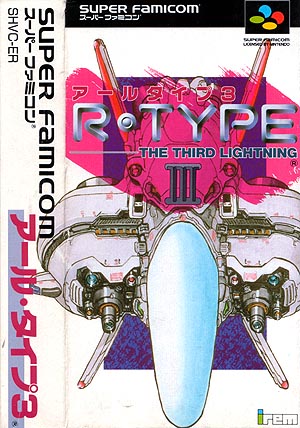
|

|
|
アールタイプ3
©1993 Irem Corp.
Release: 1993-12-10 (¥9800)
Cartridge SHVC-ER
Shooter / Horizontal


|
Released in America as
R-TYPE III
( SNS-ER-USA )
|


|
Released in Europe as
R-TYPE III
( SNSP-ER-XXX )
|
|
R-Type III is the Super Famicom exclusive sequel
to the arcade game R-Type II originally released in the arcades in 1989.
The Bydo Empire is back! Earth has fought two major battles against
this terrific enemy but their armies are once again ready to
conquer our planet. This time around, the R-90 Ragnarok ship is
deployed to counter the attack. In the R-Type tradition,
the powerful ship can use the Force, a floating orb
built on stolen alien technology. The orb is indestructible and
can protect the ship, or be thrown at the enemy and inflict devastating
damage. However, R-Type III introduces
three Force variations to choose from at the start of the game - the original
Round Force, the Shadow Force (which features floating turrets)
and the Cyclone Force (which doesn't shoot when detached but seems to inflict
a lot more contact damage). Each variation also comes with its own set of weapons.
Another signature attack from the
R-Type series is the charging shot - the player can hold the
fire button for a few seconds to charge-up a powerful blast of energy.
Once again, R-Type III comes with its own twist on the formula - the player can
hold the attack button a little longer to unleash a ball of energy strong enough
to pass through anything, from solid walls to enemy attacks!
Additionally, holding the Right-shoulder button
before charging triggers a second beam mode called Hyper-charge that releases a powerful
wave of energy blasts for a few seconds. This devastative attacks comes
at a price at the R-90 will overheat and will be unable to use
any charging-attack for a few seconds.
R-Type III consists
of six large stages and features a two (non-simultaneous) player mode.
|
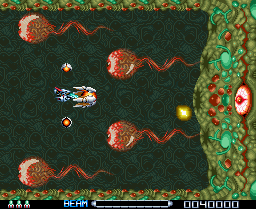 There is a slight and rather surprising difference between the original
Japanese version of R-Type III and the American (and therefore world-wide)
releases of the game. The boss at the end of
the second organic stage doesn't shoot spermatozoid-like creatures at the player,
but more "appropriate" giant flying eyeballs (picture on the right).
Back in the 1990s, Nintendo of America was really strict with
what was allowed on the system, and this change illustrates the
censorship restrictions existing at the time. Additionally, and for
some really obscure reasons, the American version doesn't feature
any staff-roll/credits at the end of the game unlike the original
Japanese game.
There is a slight and rather surprising difference between the original
Japanese version of R-Type III and the American (and therefore world-wide)
releases of the game. The boss at the end of
the second organic stage doesn't shoot spermatozoid-like creatures at the player,
but more "appropriate" giant flying eyeballs (picture on the right).
Back in the 1990s, Nintendo of America was really strict with
what was allowed on the system, and this change illustrates the
censorship restrictions existing at the time. Additionally, and for
some really obscure reasons, the American version doesn't feature
any staff-roll/credits at the end of the game unlike the original
Japanese game.
|
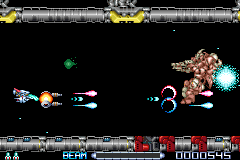 R-Type III was exclusive to Nintendo's 16-bit system for the longest time.
But in 2004, the game was ported to the Game Boy Advance by Raylight Studio (picture on the left),
an European video game studio based in Italy. For that matter, it was apparently only
released in the US and Europe. The game looks more than correct at first sight - the
view is slightly smaller than the original game but it features a password system
allowing the player to save his progress and start the game at the beginning of
each level. But the port suffers from several fatal flaws... the rate of
fire is a lot lower that the original game and the hit detection is
overall a little sketchy. The soundtrack is also terrible for some
obscure reasons.
R-Type III was exclusive to Nintendo's 16-bit system for the longest time.
But in 2004, the game was ported to the Game Boy Advance by Raylight Studio (picture on the left),
an European video game studio based in Italy. For that matter, it was apparently only
released in the US and Europe. The game looks more than correct at first sight - the
view is slightly smaller than the original game but it features a password system
allowing the player to save his progress and start the game at the beginning of
each level. But the port suffers from several fatal flaws... the rate of
fire is a lot lower that the original game and the hit detection is
overall a little sketchy. The soundtrack is also terrible for some
obscure reasons.
|
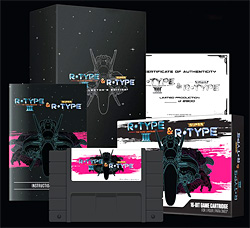 If you are a fan of Super R-Type and R-Type III, then read on.
Retro-Bit released in 2018 a gorgeous Collector's Edition that
includes both games. The bundle (picture on the right) includes a cartridge compatible with the original
SNES (the first 1000 units came with a special limited edition
blue cartridge) and a hard embossed collector's box. It also includes several
goodies such as a hard covered notebook, a limited edition pin set,
a handful of original art prints and an exclusive sticker collection.
If you are a fan of Super R-Type and R-Type III, then read on.
Retro-Bit released in 2018 a gorgeous Collector's Edition that
includes both games. The bundle (picture on the right) includes a cartridge compatible with the original
SNES (the first 1000 units came with a special limited edition
blue cartridge) and a hard embossed collector's box. It also includes several
goodies such as a hard covered notebook, a limited edition pin set,
a handful of original art prints and an exclusive sticker collection.
|
|
Interestingly, R-Type III is actually the fourth game in the R-Type
series and was released after R-Type (1987), R-Type II (1989)
and R-Type Leo (1992). However, R-Type Leo is considered as a
spin-off and plays really differently than any other games in the series,
which may explain why R-Type III was named this way.
Interestingly, R-Type III was apparently developed by Tamtex, a
video game studio established in 1986 which was later
merged into Irem's Tokyo development division.
But most importantly, several members of the staff on R-Type III actually
worked on another excellent Famicom game called
Jūryoku Sōkō Metal Storm,
which features many references to R-Type and may actually take place in the
same universe!
|
Teaser text from the American version:
Under a new Bydo
threat, Earth retaliates
It was believed on Earth that the deadly
BYDO Empire had been destroyed--but now
they've returned, as nasty as ever. Their
ships and armies are more powerful than
before, and Earth will surely be conquered
unless the new R-90 ship can destroy them.
Powered with engines that launch it into
different dimensions, and armed with the
Round, Shadow, and Cyclone Forces, R-90
has what it takes to wipe out the BYDO
threat. Then, the BYDO mother ship must
be found and destroyed to entirely erase the
species from our galaxy.
|
Teaser text from the European version:
Under a new Bydo
threat, Earth unveils
It was believed on Earth that the deadly
BYDO Empire had been destroyed--but now
they've returned, as nasty as sever. Their
ships and armies are more powerful than
before, and Earth will surely be conquered
unless the new R-90 ship can destroy them.
Powered with engines that launch it into
different dimensions, and armed with the
Round, Shadow, and Cyclone Forces, R-90
has what it takes to wipe out the BYDO
threat. Then, the BYDO mother ship must be
found and destroyed to entirely erase the
species from our galaxy.
|
Game Staff (Copied from the Japanese version's end credits) :
|
STAFF
Producer
H. Saitoh
Planner
K. Miyata
Programer
Main Program
and Stage (1,4,6)
Y. Kumite
Stage (2,3,5)
and Opening,
Ending, Force Select
Y. Suzuki
Sound Engineer
H. Saitoh
Tool Support
H. Yamashita
|
|
Graphic Designer
Stage BG (1,2,3,4,5)
Boss (1,2,5,6)
Force Select BG
T. Ohdachi
Stage OBJ (1,2,3,4,5)
Boss (3,4,5)
K. Sato
Stage BG (6)
Stage OBJ (1,6)
Ending
T. Saitoh
Title,
R-9 Zero
and System Graphics
K. Miyata
|
|
Music Composed
and Sound Effect
I. Mimori
Special Thanks
K. Tajima
M. Matsumoto
K. Umebara
T. Kudo
R-9 Plus
Executive Producer
Moto
Directed By
K. Miyata
|
|
O
M
A
K
E
|
|
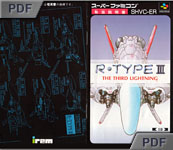
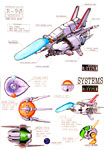
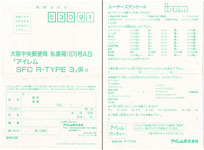
|
|
|
Click on picture to enlarge |
S
E
C
R
E
T
S
|
|
Stage Select (Japanese version):
This cheat sadly only works with the Japanese version of the game.
After you lose a life and at the continue screen, press
Right Shoulder ten times and then press Left Shoulder
a number of times. The number of times Left Shoulder is pressed
indicates the stage you want to skip to. When done, press Start
to continue.
|
|
|
|
LK

|
|
Add your Pov here !
|
P
O
V
s
|
|
R-Type III is a masterpiece and one of the best shooter for the
Super Famicom system. Irem managed here to produce a sequel that really
captured the very soul of the original game - well, this obviously means
that the game is hard, really hard, and some stages will need to be fully
memorized in order to be completed. Granted, this is the reason why
R-Type has always had this fascinating, yet frustrating, learning curve.
Nonetheless, you will end up going a little further each time you play
and literally breeze through the first stages. You have to learn your way through the game,
and R-Type III will chew you up and spit you out without much effort
if you don't.
Graphics are some of the most beautiful and impressive I have seen for the
Super Famicom system and the level design is just genius. Stages are huge
and feature excellent and novel ideas, such at the rotating space station in the first
stage, the acid falling from the ceiling in the second stage and dissolving
elements of the background, or the dimensional-sphere later in the game.
R-Type III also features every visual trickery the Super
Famicom has to offer with gorgeous multi-layered backgrounds where the
Mode 7 is cleverly used throughout. The game only suffers from
rare slowdowns in places, but nothing bad. All in all, this title is a must
have for any shooter fan, especially when the Game Boy Advance port
released in 2004 is surprisingly far from getting anywhere near
this masterpiece.
|
|
|
|